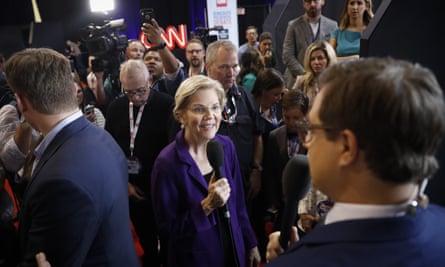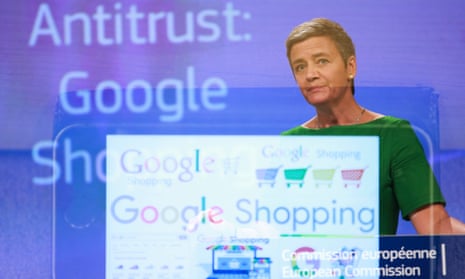Just for a moment, let us pull our eyes away from Brexit and focus instead on two interwoven stories about how the world has gone wrong, and what it might take to start to put it right. At the centre of each is a woman who has set herself against the male-dominated corporations we collectively know as big tech. What is happening is about high politics and the grind of government rather than street-level noise and mass activism, which is maybe why it still seems overlooked.
The frontrunner in the US Democratic party’s crowded nomination contest seems to be the Massachusetts senator Elizabeth Warren. Over the past couple of years she has hardened her intentions to tackle the power of Apple, Google, Amazon and Facebook. Thanks to leaked recordings of Mark Zuckerberg addressing a meeting of his staff, we know he seems to consider her plans an “existential” threat that would “suck for us”, and that he would “go to the mat” to fight them.
Wherever the “mat” is, Warren seems to be there already. Ten days ago, she highlighted Facebook’s mixture of massive power and abject irresponsibility by confronting Zuckerberg with its decision, taken last year, to exempt political ads from its rules on false and misleading content – something recently manifested in Trump campaign ads that tell demonstrable lies about Warren’s Democratic rival Joe Biden. In response, Warren’s organisation put material on Facebook that told users that Zuckerberg was a Donald Trump supporter – before pointing out the falsehood, and reminding users that the company has given the president “free rein to lie”.
Her basic point was punchy and effective: “Facebook holds incredible power to affect elections and our national debate. They’ve decided to let political figures lie to you – even about Facebook itself – while their executives and their investors get even richer off the ads containing these lies.”
In response, with his usual cosmic levels of chutzpah, Zuckerberg used a speech last week to frame his blithe attitude to political lying in terms of free speech, citing Martin Luther King, claiming Facebook was founded in the wake of the Iraq war to ensure people had “a voice” (short correction: its origins actually go back to a “hot or not” website for Harvard students) and that his company represents a new “fifth estate” central to the workings of democracy. The whole thing would have been funny, if it hadn’t shown us Zuckerberg does not have the sensitivity or humility to match his company’s power.

True to the way that a news cycle tied to social media tends to work, the clash over political ads is already obscuring the key issues Warren is talking about. She has two big objections to the way Facebook and other tech giants exercise their power. One is how they have endlessly been allowed to acquire potentially threatening competitors – so if she got her way, Facebook’s acquisitions of Instagram and WhatsApp would be reversed. She would also classify big companies that offer their users an online marketplace, an exchange, or a platform for connecting third parties as “platform utilities”, and if their annual global revenue exceeds $25bn (£19bn), insist they cannot carry on selling their own products via the spaces they host.
As a result, Apple would no longer be able to offer Apple Music and Apple News on its online store, and Amazon couldn’t hawk its own goods alongside those of third-party sellers. This is big stuff: whatever its chances of getting through a future Congress, it at least represents the kind of clear, coherent programme for starting to deal with big tech that has so far tended to get lost in a haze of ifs and buts.
A parallel story is unfolding in Europe. For five years, the Danish former politician Margrethe Vestager has been the European commissioner for competition. Her record is studded with big moves on the same corporations targeted by Warren – among them, a demand for €13bn (£11bn) in unpaid Irish taxes from Apple, and a €1.5bn fine levied this year against Google for abusive advertising practices. Her take on social media is crisp: “I would like to have a Facebook in which I pay a fee each month, but I would have no tracking and advertising and the full benefits of privacy.”
Trump thinks Vestager “hates the United States, perhaps worse than any person I have ever met”, an opinion which seems only to have propelled her further: she is about to start work as European commission vice-president in charge of “Europe fit for the digital age”, and combine her anti-monopoly activities with a dedicated focus on tech.
While Britain may be sailing off into whatever zero-regulation dystopia the Conservatives have in mind, Vestager wants EU countries to at last get to grips with what tech is doing to the most basic aspects of society. She apparently wants to prioritise people’s control of their data, and insists that Europe’s use of artificial intelligence must be within the kind of ethical guidelines absent in the US and China.
What this will mean in practice is so far unclear. But it dovetails with EU plans for restrictions on facial recognition technology – and potentially, the kind of malignant AI lately chronicled in the Guardian’s series on what automation is doing to the welfare state and how it treats poor and vulnerable people.
Something is belatedly happening, on both the right and left, as well as in the heart of national governments: from France’s new tax on the local profits of tech corporations to the US Federal Trade Commission’s robust noises about their reach, the most unbridled kind of corporate power is at last being meaningfully contested.
Meanwhile, every week seems to bring signs that the companies’ old veneer of invincibility is cracking, something vividly highlighted by the mounting crises befalling Facebook’s hubristic plans for a new online currency, which Zuckerberg will try to explain to a congressional committee this week. Big tech’s lobbyists are clearly readying themselves for a series of showdowns about the extent of its power.
The key problem comes down to the difficulty of pursuing big tech in a world that it not only controls, but defines. We read about Warren and Vestager on the same feeds that dissolve even the best intentions into the usual meaningless noise. But, on a good day, what seems to be happening brings to mind the call to action that concludes Shoshana Zuboff’s The Age of Surveillance Capitalism. “It is up to us to use our knowledge, to regain our bearings, to stir others to do the same, and to found a new beginning,” she says. Maybe – just maybe – we are starting to see what that might look like in practice.

